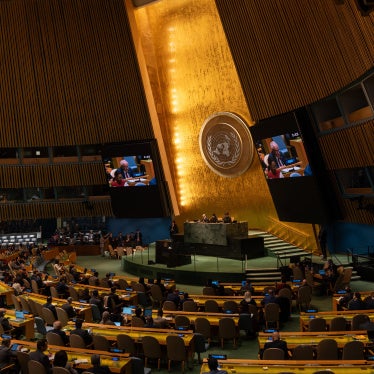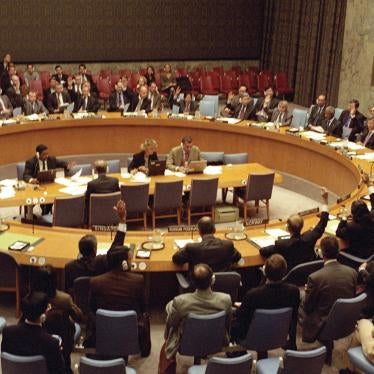Human Rights Watch supports the proposal now discussed by members of this Commission to create a special rapporteur on the promotion and protection of human rights while countering terrorism. Terrorism is the very antithesis of human rights, but human rights abuses committed in the name of counter-terrorism serve to fuel terrorism, not end it.
Counter-terrorism measures continue to violate human rights in many countries. Abuses include: prolonged, incommunicado detention without judicial review; torture and cruel, inhuman, and degrading treatment of detainees; the transfer, return, extradition, and expulsion of persons at risk of being subjected to torture or ill treatment; and the adoption of security measures that curtail the right to freedom of association and movement and breach the principle of non-discrimination.
The new rapporteur would fill the important gap in the existing system of special procedures that has been identified by recent studies, including by the independent expert and supported by the secretary-general and the international community. This new mandate, established for three years, should, among other things: identify, exchange, and promote best practices on measures to counter terrorism that respect human rights and fundamental freedoms; gather information from all relevant sources, including through country visits; develop regular dialogue with relevant actors including governments, UN bodies, other mandate holders, and, in particular, the Counter Terrorism Committee of the Security Council; act as an early warning mechanism by calling attention to situations that could result in human rights and fundamental freedom violations while countering terrorism; and report regularly to the Commission and the General Assembly. The creation of such mandate is perhaps the most important step that this Commission should take. We hope you will all collectively act.
Mr. Chairman,
Human Rights Watch welcomes the Commission’s efforts to address corporate accountability for human rights abuses. A recent report by the Office of the High Commissioner for Human Rights (OHCHR), prepared at the Commission’s request, makes a valuable contribution. The report describes the need to address the responsibilities of business entities, but also a gap in understanding those responsibilities. It notes that the U.N. norms on business and human rights attempt to bridge that gap. The report highlights the need for the close study of fundamental issues, including the concept of “complicity,” “spheres of influence,” and how to protect human rights when states are “unwilling or unable” to do so.
We are encouraged by indications that member states on the Commission may appoint a high-level expert on business and human rights to examine these important issues. In our view, the expert must be truly independent and have human rights expertise. The expert’s mandate should include studying outstanding issues identified in the OHCHR report, analyzing standards of corporate responsibility and available implementation mechanisms, and proposing additional measures to address accountability for abuses. Moreover, the independent expert should engage in consultations with relevant stakeholders, including affected communities, and provide regular reports on progress. This process should build upon the U.N. Norms.
Last year, the Commission indicated its interest to “identify options for strengthening standards […] and possible means of implementation” on the human rights responsibilities of businesses. It must not step back from that goal. The Commission should call for an independent, qualified expert with a strong mandate.
Thank you.







